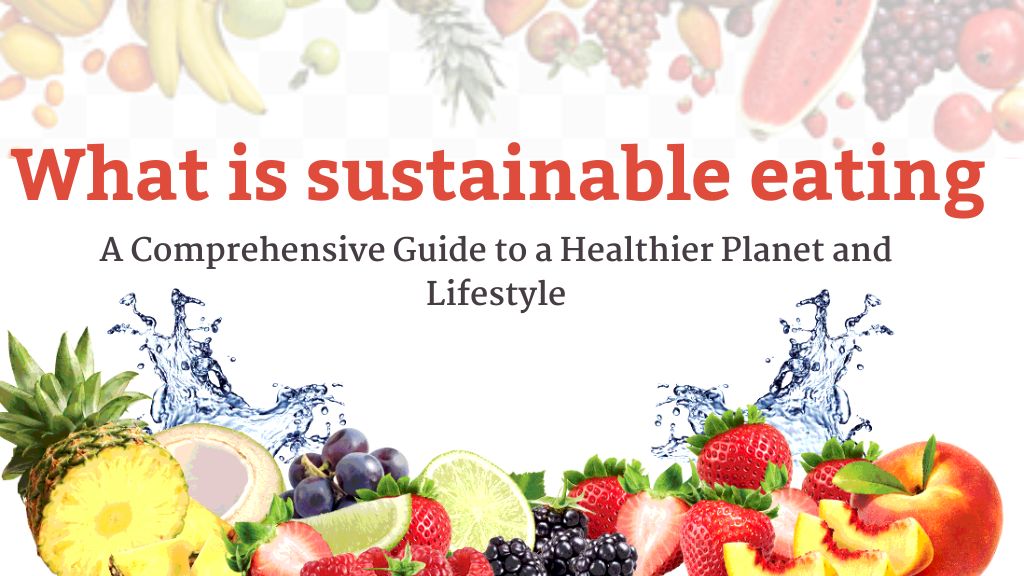Sustainable eating has become a significant movement as people become more aware of the environmental impact of their dietary choices. This practice involves selecting foods that are not only nutritious and beneficial for personal health but also have a minimal impact on the environment. Embracing sustainable eating means making mindful decisions about the food we consume, considering factors such as production methods, transportation, and overall ecological footprint.

What is Sustainable Eating?
Sustainable eating is a way of consuming food that promotes environmental health, economic viability, and social equity. It involves choosing foods that are:
- Environmentally Friendly: Produced with minimal impact on the planet, reducing carbon emissions, water usage, and soil degradation.
- Nutritionally Beneficial: High in essential nutrients to support a healthy diet.
- Economically Viable: Affordable and supports local economies.
- Ethically Sourced: Produced under fair labor practices and humane conditions.
The Importance of Sustainable Eating
- Environmental Impact: The food industry is a significant contributor to greenhouse gas emissions, deforestation, and water pollution. Sustainable eating helps mitigate these effects by supporting eco-friendly farming practices and reducing food waste.
- Health Benefits: A sustainable diet is rich in whole foods, such as fruits, vegetables, whole grains, and lean proteins. These foods provide essential nutrients and can reduce the risk of chronic diseases.
- Economic Benefits: Supporting local farmers and sustainable food producers helps boost the local economy and reduces the need for long-distance transportation, which lowers carbon emissions.
- Social Responsibility: Choosing ethically sourced foods ensures fair wages and safe working conditions for laborers, promoting social equity and justice.
How to Adopt Sustainable Eating Habits
- Choose Local and Seasonal Foods: Eating locally grown and seasonal foods reduces the carbon footprint associated with transportation and supports local farmers.
- Reduce Meat Consumption: The meat industry is one of the largest contributors to greenhouse gas emissions. Incorporating more plant-based meals into your diet can significantly reduce your environmental impact.
- Opt for Organic and Non-GMO Foods: Organic farming practices avoid synthetic pesticides and fertilizers, which can harm the environment. Non-GMO foods ensure biodiversity and ecosystem health.
- Minimize Food Waste: Plan meals, store food properly, and use leftovers creatively to reduce waste. Composting organic waste also helps recycle nutrients back into the soil.
- Support Sustainable Fisheries: Choose seafood that is sustainably sourced to prevent overfishing and protect marine ecosystems.
Sustainable Eating on a Budget
Many people believe that eating sustainably is expensive, but it doesn’t have to be. Here are some tips to make sustainable eating affordable:
- Buy in Bulk: Purchase grains, legumes, and nuts in bulk to save money and reduce packaging waste.
- Cook at Home: Preparing meals at home is generally cheaper and allows you to control ingredients and portions.
- Grow Your Own Food: Start a small garden to grow your own fruits, vegetables, and herbs. Even a few potted plants can make a difference.
- Shop at Farmers’ Markets: Local markets often offer fresh, seasonal produce at lower prices than supermarkets.
- Plan Your Meals: Meal planning helps you avoid impulse buys and ensures you use all the food you purchase, reducing waste.
Delicious and Sustainable Recipes
Here are a few sustainable recipes to get you started:
Veggie-Packed Quinoa Salad
Ingredients:
- 1 cup quinoa
- 2 cups water or vegetable broth
- 1 cucumber, diced
- 1 bell pepper, diced
- 1 cup cherry tomatoes, halved
- 1/4 cup red onion, finely chopped
- 1/4 cup fresh parsley, chopped
- 1/4 cup olive oil
- 2 tablespoons lemon juice
- Salt and pepper to taste
Instructions:
- Rinse quinoa under cold water. In a medium pot, combine quinoa and water or broth. Bring to a boil, then reduce heat and simmer for 15 minutes or until quinoa is tender and water is absorbed.
- In a large bowl, combine cooked quinoa, cucumber, bell pepper, cherry tomatoes, red onion, and parsley.
- In a small bowl, whisk together olive oil, lemon juice, salt, and pepper. Pour over quinoa salad and toss to coat.
- Serve chilled or at room temperature.
Lentil and Vegetable Stew
Ingredients:
- 1 cup lentils, rinsed and drained
- 1 onion, chopped
- 2 carrots, diced
- 2 celery stalks, diced
- 1 zucchini, diced
- 4 cups vegetable broth
- 2 tablespoons tomato paste
- 1 teaspoon dried thyme
- 1 teaspoon dried rosemary
- Salt and pepper to taste
Instructions:
- In a large pot, sauté onion, carrots, and celery over medium heat until vegetables are tender.
- Add zucchini, lentils, vegetable broth, tomato paste, thyme, rosemary, salt, and pepper. Bring to a boil.
- Reduce heat and simmer for 30 minutes or until lentils and vegetables are tender.
- Serve hot, garnished with fresh herbs if desired.
The Future of Sustainable Eating
The future of sustainable eating looks promising as more individuals, communities, and businesses commit to environmentally friendly practices. Innovations in food technology, such as plant-based proteins and lab-grown meat, are also paving the way for more sustainable options.
Governments and organizations worldwide are implementing policies and initiatives to promote sustainable agriculture and reduce food waste. Consumer demand for transparency and sustainability is driving change in the food industry, encouraging companies to adopt greener practices.
Conclusion
Sustainable eating is not just a trend; it’s a necessary shift towards a healthier planet and lifestyle. By making mindful choices about the food we consume, we can significantly reduce our environmental impact, support local economies, and improve our overall health. Whether you’re just starting your journey or looking to deepen your commitment to sustainability, every small step counts. Embrace sustainable eating today and contribute to a better future for all.
READ MORE : Why Being a Perfectionist Is So Bad for Our Health